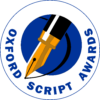Bryan Regan
Thank you Bryan for taking the time to answer all of our questions. We truly appreciate our collaboration and all that you have shared with us. At Oxford Script Awards we are wishing you a huge success with your next projects. Keep up the amazing work!
I’ve been a practicing attorney for over 17 years but always enjoyed creative writing. My mother always encouraged me to start writing for myself and I finally took up her advice about 8 years ago. I started with a novel, then short stories, and now I focus more on screenplays. Writing always takes me on a fun trip that only comes to an end when I finish the piece. I enjoy the process and will continue to write as long as that enjoyment remains.
When it comes to story creation, I often start with a character or two that I want the reader to focus on, but, more importantly, I create characters that I, myself, am interested in. Though roughly 75% of what I develop about a key character (his/her background) doesn’t see its way onto the page, I imagine what made them do or say the things that are in the script. I also always start knowing how the movie/show opens, and how it ends. Then, I work on plot points/turning points and beats that pop, hopefully making the reader want to continue forward. The fun, but also most challenging part, is filling in the blanks, the journey, that takes us from A to Z. I enjoy imagining music that goes with particular scenes as well. And outline, always outline.
With respect to the subject project, Beacon Beyond the Bay, it is a true story based on my friend’s parents’ escape from China in 1968. The goal was to keep the script as authentic to the true account as possible while creating a story that immerses the reader into our world. There was so much information and detail to work with and spec scripts are only supposed to be, at most, 120 pages in length. Staying under the page limit, while maintaining the authenticity via use of vivid detail was a difficult, but also rewarding task.
I think a lot of people will say plot, and that may be true – ie. if the plot is great, how can it go wrong? However, I most enjoy focusing on character, ie. writing about real people and true human interactions, because I think that is the element that is most relatable to the audience, and myself.
By all accounts, it is a difficult time to produce new films, especially getting spec scripts from page to production. There are seemingly more and more big budget films and less indie darlings. However, I think it’s important to keep writing, and keep the faith in the audience and demands for films we can all relate to, especially those which motivate us to be better.
To date, I have mostly written dramas so I tend to follow the same outline set forth above. I’ve written a few short comedic stories and I think the difference there is that the humor has to be derived from personal taste. If you’re writing about issues or characters that you find humorous, then others (not all) will find it funny as well. It has to feel authentic, and you have to remember you can’t please everyone. As for process though, I don’t think that changes much based on the genre you are writing for (though I haven’t done horror yet, haha).
There are few things harder than finishing a script that you believe to be a gem only to see it ripped apart by a reviewer. However, the reality is it takes a countless number of revisions to get your script right, and you have to always consider the criticism – it’s helping you more than hurting you. If multiple reviews are harping on the same issues, then they’re probably right – there’s a problem. How you fix that problem or issue is within your power, however, as it’s your story, and ultimately, you get to decide what feedback/criticism to abide by, and which to brush aside.
I just finished my fourth feature screenplay, the Flamenco Dancer, about an ageing, talented, but tormented dancer trying to overcome past trauma so he can spend more time with his young, estranged daughter and make it to the next level in his art form. It’s very exciting because it was conjured entirely from my imagination after seeing a show in Spain last summer and fantasizing about what the main dancer’s life could be like. This is the first time I created a feature that was not a “write what you know” or true story, and it was very exciting and fun.
Ask me in 5 years. I don’t think AI can prepare a script the way a human can, so I’m hoping it won’t have an adverse affect on it. I’m hoping more indie movies make their way back to the big screen and the only way for that to happen is for writers to continue to write, and be patient.
Keep writing, always. No matter how good your first or second is, or how many great reviews you receive, or contests you win, you can continue to hone your practice only by continuously doing it. If you have an idea, write it down – nothing gets made from your mind only. If your first or second or third script doesn’t get made, keep writing. If you truly enjoy it, it’s not work, and quitting is never an option.
